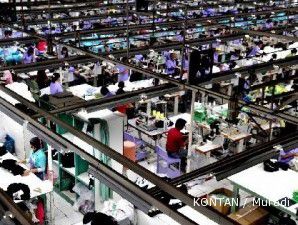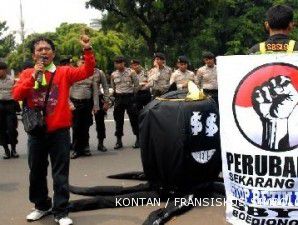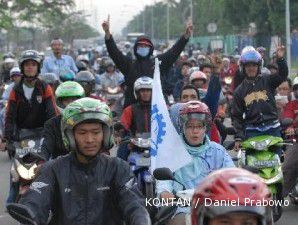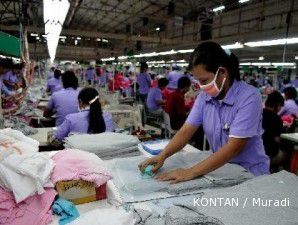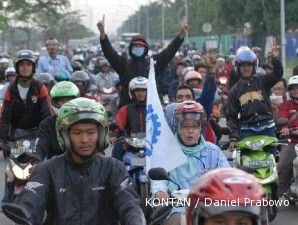JAKARTA. Japanese and South Korean emissaries along with a representative of the Taiwan administration have filed complaints to the Indonesian government over its handling of the recent labor unrest, claiming that it has severely harmed their businesses here.
The three countries, which are Indonesia’s largest investors in labor-intensive sectors — textiles, footwear and electronics — said they believed Indonesia would lose its strength in netting new foreign direct investment should similar incidents occur in the future.
Japan has sent a letter to the National Police to request it pay more attention to securing Japanese businesses and citizens, and to ensure security amid tensions created by the ongoing labor rows. “We want to ensure that the companies are safe, not only for Japanese citizens who work there, but also for their local workers,” Japanese Embassy spokesman Masaki Tani said recently.
During a rally on Jan. 27 in which tens of thousands of Bekasi workers took out their anger over wage issues by cutting off access to the Jakarta–Cikarang toll road, businessmen complained about a lack of security in industrial estates.
Workers, aided by local thugs, pressured workers to join the protests by threatening them with violence. Racist remarks were also lauded by the protesters, igniting concern that the row might spiral into a racial issue.
Properties of several Korean companies were damaged during the rally, according to the Korean Embassy.
“They [the workers] blocked roads, and took other mass action that not only caused severe traffic congestion but also hampered factory operations by preventing Korean employees from going to work and damaging the properties of several Korean companies,” a letter from the South Korean Embassy to Coordinating Economic Minister Hatta Rajasa read. The Embassy has urged the Indonesian government to find ways to address the issue.
President of the Korean Chamber of Commerce in Indonesia (Kocham) CK Song said that most of the South Korean labor-intensive companies felt uncomfortable with the incident, and were concerned about the future of their business operations.
“Along with Indonesia’s Master Plan for Economic Development, there are a lot of Korean companies who are still willing to invest more in Indonesia in various sectors. However, we are afraid that any bad perception of the current atmosphere and image could be of great concern for future potential new investors.”
Economic director of Taipei Economic and Trade Office in Indonesia (TETO) YC Tsai said the uprising had prompted some Taiwanese companies to move their factories from Greater Jakarta to other parts of the country, or even overseas.
“Ideally, the wage rises must be in line with the level of inflation. Beyond that is something that we consider unexpected,” Tsai said recently.
In response to the recent incident, Taiwanese companies are considering raising their product prices or negotiating new salary levels with their employees, according to Tsai. TETO has sent letters to the BKPM expressing its concerns over the issue.
Currently, there are around 12,000 Taiwanese, 1,600 Korean and 1,000 Japanese companies operating in Indonesia, employing more than 1.8 million local workers. Japan and South Korea are the country’s second- and fifth-largest foreign direct investors, respectively. The majority of the companies have their production facilities in Bekasi, West Java, and Tangerang, Banten.
The labor issue in Bekasi and Tangerang erupted in early January when the Indonesian Employers Association (Apindo) filed a lawsuit against the West Java and Banten administrations for endorsing a greater than 15 percent rise in minimum wages, more than four times last year’s inflation rate of 3.79 percent.
Bekasi labors unions agreed to end the protest following Apindo’s decision to comply with their demands, while Tangerang unions have said they intend to hold a strike and protest on Feb. 9 in which they will block the entrances to all toll roads connecting Jakarta with Merak Port and Soekarno-Hatta International Airport. (Hasyim Widhiarto/ The Jakarta Post)
Labor unrest spooks investors
February 07, 2012, 08.45 AM
/2012/02/07/1831441354.jpg)
Film Black Panther dari Marvel Studios yang dibintangi Chadwick Boseman.
Reporter: Edy Can
| Editor: Edy Can
Latest News
-
March 02, 2026, 04.45 PM
Indonesia has Seized 5 Million Hectares of Palm Oil Plantations, Task Force Says
-
March 02, 2026, 01.10 PM
Asian Assets Slide as Mideast Strikes Spark Oil Spike, Haven Rush
-
March 02, 2026, 10.49 AM
Bank Indonesia Monitoring Market Movements in Response to Conflict in Middle East
-
February 25, 2026, 08.28 PM
Inpex to Solicit Bids for Construction of Indonesia's Abadi LNG Project in Mid-2026
-
February 24, 2026, 03.38 PM
Eni to Reach Final Investment Decision for Indonesia Gas Projects Next Month
-
February 24, 2026, 01.00 PM
Asia Stocks Try to Steady after Wall Street Selloff Sims Mood
-
February 23, 2026, 04.50 PM
Wall Street Futures and Dollar Slide on Trump Tariff Tumult
-
February 23, 2026, 02.17 PM
Indonesia's Government Spending Jumps 26% in January 2026
-
February 23, 2026, 01.47 PM
Indonesia's Government Spending Jumps 26% in January
